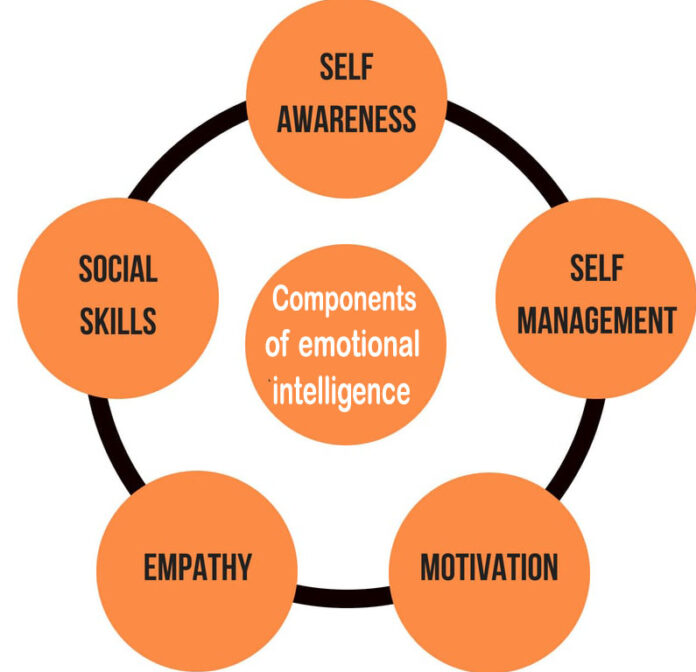
Components of Emotional Intelligence
Danial Goleman Emotional Intelligence is a psychological theory, first presented by Peter Salovey and John Mayer in the late 1980s. Daniel Goleman is a famous American science journalist and wrote many renowned works on emotional Intelligence. He developed five key components of Emotional Intelligence in his book “Emotional Intelligence” in 1995. In his work, he emphasized and elucidates that the Emotional Quotient (EQ) level is more important than Intelligence Quotient (IQ) level.
Win Global Genius Award and get instant cash prize
Emotional Intelligence has some dimensions which make the path to follow it effectively in its relative field. These dimensions modify five components of Emotional Intelligence according to Daniel Gilman’s leadership. Goleman five components of Emotional Intelligence are here:
- Self-awareness in Emotional Intelligence.
- Self-management in Emotional Intelligence.
- Motivation in Emotional intelligence.
- Social awareness in Emotional Intelligence.
- Empathy in Emotional Intelligence.
1. Self-awareness in Emotional Intelligence
Self-awareness is a very crucial and vital component of Emotional Intelligence. Every person has some qualities and weaknesses. If a leader acknowledges his weakness and strengths, it means he is self-aware of his personality. According to Daniel Goleman’s leadership, a leader should be well self-aware for successful leadership. Self-awareness in emotional intelligence gives you a clear picture of yourself which help you to understand other persons’ opinion. Your weakness always creates hurdles in decision-making and problem solving for effective leadership. It gives a sense to a leader that how to behave your clients and colleagues with humility in crises.
A self-aware leader can work efficiently and give a soft corner to his subordinates and patrons if weakness occurred during bad situations because a self-aware person knows the drawbacks of his personality as well as others. Sometimes other people tell the weaknesses about you, remember your weak points so that in future this assessment will help you that how you perform competently. Moreover, if a person has the ability and courage to judge his strengths and weaknesses, its means that this is a good leader who can easily understand their clients and their inner thoughts perfectly.
How a person can improve self-awareness?
Here are the suggestions to improve self-awareness
Write Down Your Thoughts
Write down your thoughts and keep notes on yourself on a paper and take a closer look with analysis of it in different tempers of your own. Write down your qualities and drawbacks. Think about your traits and modifies them in a better way.
Take Professional Help
A good coach can give you invaluable professional help and feedback to assess yourself. A good assessor and evaluator can boost your personality and enhance your self-awareness.
Ask someone else about you
Give a free hand to a person, friend, or colleague to judge or observe your traits from critical angles. It can help you to improve your habits, needs, and personality.
Open Criticism
Hear and bear criticism openly, take it positively and polish your weak points through this criticism. Apply an optimistic approach and take this criticism as an error finder for you. Always ready and be open to change yourself constructively.
Hold Your Intuitions
Sometimes your conscience draws your attention towards your weak points; this is the time to hear your voice of conscience. This is self-assessment but it’s a very difficult task to improve yourself and apply these to your personality because this is the hidden voice of conscience that approaches moral values.
2. Self-management in Emotional Intelligence
Self-management in Emotional Intelligence is the second important component of emotional intelligence. Self-management in emotional intelligence is also known as self-regulation in emotional intelligence. It means that how a person manages emergencies and jeopardies in the workplace and during handle these unavoidable situations how to control his passion and anger. Self-management is all about staying with control. Self-management in emotional intelligence means that one has the inborn or learned capacity to overcome undesirable behaviors, as well as existing, responsible, flexible, and honest.
Self-regulation also prevents you from abusing your honor of leadership to showing a negative label or to attack others and creating hurried or whimsical assessments that compromise your values. A self-managing leader very rarely or verbally attacks others because he/she has a good compromising quality of values with their clients and sub-ordinates in critical circumstances.
Win Global Genius Award and get instant cash prize
How to Improve your Self-management?
If you want to increase self-management skills, following tips will help achieve your target.
1. Don’t lose your temper or disorganized even in the worst conditions and take care of yourself in hard situations
2. Keep Practice of being Patient
3. Focus your attention on a single task and don’t overwhelm yourself with different duties.
4. Keep in mind your strengths and maximum utilize them according to the situations.
5. Set your goals and make a plan for each workday.
6. Prepare yourself for meetings and think before you speak.
3. Motivation in Emotional Intelligence
Motivation always works as a booster and give strengths in every field. So, we can say that this is a very important and crucial component of emotional intelligence. A self-motivated leader can achieve his goals consistently. Material rewards and money only can drive a person in a limited time while self-motivation is a key to success and work as an energizer to achieve the objectives.
Self-Motivation is needed when a leader faces unexpected situations at his workplace. Self-Motivation is a tonic and it works with your thoughts. If you make it your belief, there is no problem that you will not succeed. If you think “I can do it” that word will take you to extreme heights. Internal Motivation also gives you the courage to achieve your goals, aims, and objectives positively. We can differentiate motivation into two types. These are Extrinsic and Intrinsic motivation.
How we can Define Extrinsic Motivation?
Extrinsic motivation is defined into two terms. Firstly we can say that to do a job or assignment for materialistic benefits or purposes as money, reward, and trophies. A person works to achieve some material goals and rewards after completing given assignments or tasks. This is called extrinsic motivation because extrinsic elements (money, reward) approach your thoughts and force you to work. From a psychological perspective, if a person organizes work for getting praise and public acclaim, it can also be described as extrinsic motivation.
How we can define Intrinsic Motivation?
When a person actively performs a task without getting any tangible reward like money and trophies but to enjoy and getting satisfaction, it is called intrinsic motivation. Some time to do a job to avoid punishment or rude behavior of your boss can motivate you to do the task.
4. Social-awareness in emotional intelligence
If we talk about social-awareness as a component of emotional intelligence, it is defined that, “an ability that how to understand people, emerging their talents and capabilities, or optimistically empathize with them”. A good leader always has enough knowledge and know-how of social surroundings. Social-awareness plays an important role to handle many leadership problems according to Goleman leadership. Danial Goleman’s components of intelligence are very famous and give a clear picture of emotional intelligence and its components. Such a leader never loses who is well aware of social backgrounds.
Leaders who have social-awareness in emotional intelligence are great communicators. They are always excited to start a new mission or project and always motivate and praise their staff. They are ready to accept new changes in their institutes because of social-awareness.
How social-awareness is developed?
Develop Conflict Resolution Skills
A good leader is also a good problem solver, be ready to face problems and their solution according to social circumstances. A good leader must know how to handle conflicts among their clients, team members, and colleagues. If you want to succeed you have to learn conflict resolution skills.
Improve your Communication Skills
In components of emotional intelligence, social-awareness demands to improve your communication skills. If a person is a good communicator and knows the dimensions of emotional intelligence, he can survive easily in workplace.
How to Praise others
You must learn how to acclaim and praise others. This is a quality of a good leader to praise their coworkers timely and accurately. Praise and motivation work together in components of emotional intelligence.
5. Empathy in Emotional intelligence
Danial Goleman describes 5 components of emotional intelligence. Some researchers defined 4 components of emotional intelligence but 5 emotional intelligence components are very common. Empathy is the fifth component of emotional intelligence according to its nature. To manage a successful team and organization empathy plays a key role. Empathy can be a feeling, a sense, and a passion. When a leader puts him in someone else’s condition and tries to think as his patron’s empathy befalls. When you listen to someone; show some interest and enthusiasm to your teammate and clients through your body language. It gives confidence to another person that someone giving your discussion worth and thinking it valuable.
A good leader can find loyalty and respect for his team, by showing empathetic feelings to them.
Win Global Genius Award and get instant cash prize
How we can Improve Empathy?
Put yourself in someone else’s situation
Respect other’s opinions and think about as to act like them.
Give positive body language during a conversation














What a nice explanation, everything is clear, understandable……